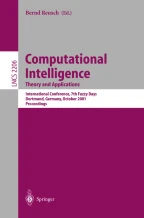Abstract
This paper examines some possibilities of improving the CORA classification algorithm developed by M. Bongard in sixties. The algorithm is based on finding features of objects one needs to classify. The theoretical part of this study explains two main shortcomings of the CORA classification algorithm: (1) the algorithm rejects features that at least once appear in the opposite class and thus loses potentially valuable information; and (2) the algorithm has extremely large learning time that can be due to the “combinatorial explosion”. The study suggests two methods to overcome these difficulties and to improve the algorithm: (1) the method of relatively good features and (2) the method of sequential covering. The experimental results demonstrate that both the methods suggested ensure a sufficient algorithm performance’s improvement as compared to the classic Bongard algorithm implementation. Best results are achieved when both methods are combined and sufficiently improve the classification precision and reduce learning time.
Access this chapter
Tax calculation will be finalised at checkout
Purchases are for personal use only
Preview
Unable to display preview. Download preview PDF.
Similar content being viewed by others
References
Bongard, M.: Problem of Recognition. Nauka Publishers, Moscow (1967) (In Russian)
Gelfand, M., Guberman, S.: Pattern Recognition Applied to Earthquake Epicenters in California. Physics of the Earth and Planetary Interiors 11 (1976) 227–283
Gladun, V.: Planning Decisions. Naukova Dumka, Kiev (1987) (In Russian)
Mitchell, T. M.: Machine Learning. The Mc Graw-Hill Companies Inc. (1997)
Weiss, S., Kapouleas, I.: An Empirical Comparison of Pattern Recognition, Neural Nets, and Machine Learning Classification Methods. Shawlik, I. W., Dietterich, T. G. (editors): Readings in Machine Learning. Morgan Kaufmann Publishers, San Mateo, California (1990) 177–183
Author information
Authors and Affiliations
Editor information
Editors and Affiliations
Rights and permissions
Copyright information
© 2001 Springer-Verlag Berlin Heidelberg
About this paper
Cite this paper
Tipans, E., Borisov, A. (2001). Some Possibilities of Improving the CORA Classification Algorithm. In: Reusch, B. (eds) Computational Intelligence. Theory and Applications. Fuzzy Days 2001. Lecture Notes in Computer Science, vol 2206. Springer, Berlin, Heidelberg. https://doi.org/10.1007/3-540-45493-4_84
Download citation
DOI: https://doi.org/10.1007/3-540-45493-4_84
Published:
Publisher Name: Springer, Berlin, Heidelberg
Print ISBN: 978-3-540-42732-2
Online ISBN: 978-3-540-45493-9
eBook Packages: Springer Book Archive
